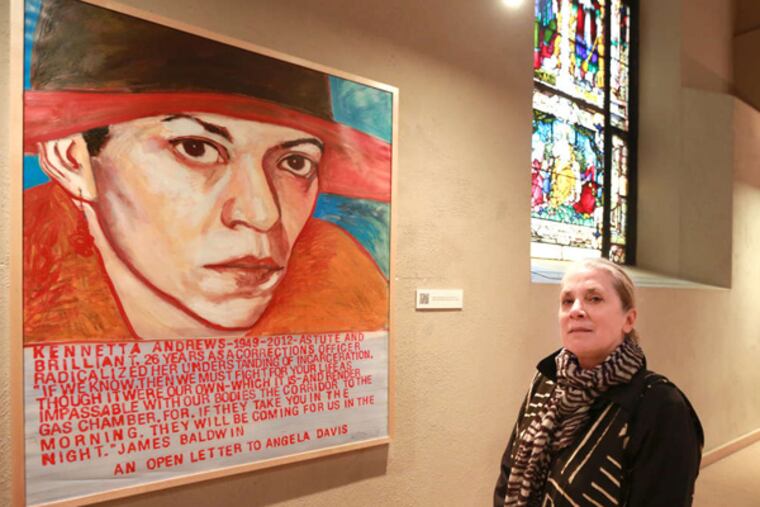Portraits of life without parole
When Mary DeWitt began painting portraits of lifers in the Pennsylvania correctional system - people even prison administrators believed deserved clemency - she was filled with optimism.

When Mary DeWitt began painting portraits of lifers in the Pennsylvania correctional system - people even prison administrators believed deserved clemency - she was filled with optimism.
"It was 1993, 1994, when I started the program, with the idea that they should've been pardoned in the '90s," she recalled.
Twenty years later, DeWitt, 65, has painted new portraits of the women - all of whom remained incarcerated.
"Then and Now: Women in Prison," an exhibition of portraits from 1996 and 2014, is on view at Philadelphia Episcopal Cathedral through next Thursday. Collectively, the works document not just long years behind prison walls, but also the transformation of incarceration in America and what DeWitt calls the "disintegration" of Pennsylvania's pardons process.
"This is a portrait of devolving," DeWitt said. "The Board of Pardons devolved. The prisons devolved from places that were rehabilitative, educational, to the prison-industrial complex." The women aged, and their dreams faded. Two died in prison.
Since 1995, when Reginald McFadden, an inmate granted clemency by Gov. Robert Casey, killed two people and raped another, the politics of clemency in Pennsylvania has changed drastically and the number of commutations for life sentences has plummeted. Casey commuted 27 in his two terms; in the last two decades, just six lifers have received commutations.
When DeWitt, of Media, began this work, it was a different era in politics and in the prisons.
She received a grant to teach painting in the prisons in 1988, and found lifers were most responsive to her instruction. In the 1990s, with the Pennsylvania Prison Society, she developed a program just for them, in which they'd paint self-portraits and she'd paint them, as well.
"I could go in and paint directly from life, just like Alice Neel, who's my favorite painter, and I could record their thoughts," she said. DeWitt referenced a 1936 Neel painting of a protest in which one man holds a sign reading "Nazis murder Jews."
"There was a write-up in the New York Times about how literal [Neel] was. And that's kind of my rap. I'm not here to be conceptual. I'm here to be literal, direct and straightforward, and she's been a great role model," she said.
DeWitt pulls text from recordings and elsewhere to scrawl directly onto the portraits; the audio is also posted online. Visitors to the exhibition can use a QR code to find videos of the women's stories.
She has also translated those stories into tiled murals, one at Third and Poplar and another at 44th and Locust.
Over the years, DeWitt at times set the project aside. But her friendships with the women endured. Their struggles keep drawing her back in.
Some have applied for clemency three or four times. Cyd Berger, serving life for murder, is applying yet again.
"She was a severely battered woman. Her batterer committed the murder, and under severe distress she had to be there," DeWitt said. "The women I paint and champion were all first-time offenders, and I think most people would agree with me that they should have been pardoned 20 years ago."
Of course, public opinion is more complicated than that. DeWitt wants to make the women society has locked away "visible and accessible" - but even prisoner-advocacy groups are wary of making waves by upsetting victims and their families. (That's the main reason she now works independently.)
Her work also appears to run contrary to a law Gov. Corbett signed this week enabling prosecutors and victims to sue violent offenders for conduct that "perpetuates the continuing effect of the crime." The legislation - introduced after Mumia Abu-Jamal, convicted in the 1981 shooting of a police officer, gave a widely publicized video commencement address - is seen by critics as a way to silence inmates.
DeWitt, though, wants to go back into the prisons to call attention to yet another group of inmates: lifers convicted as juveniles.
Pennsylvania has sentenced more juveniles to life without parole than any other state or nation. In 2012, the Supreme Court ruled mandatory life sentences for juveniles unconstitutional, but that ruling has not been made retroactive here.
For Philadelphia Episcopal Cathedral, on 38th Street north of Chestnut, to host this exhibition is to take a stand. Anne Minich, who organized the show, told DeWitt it was a natural fit and described the women as "martyrs."
"This public exhibition is so staggeringly powerful in how it lifts up issues of human dignity," said Judith Sullivan, dean of the cathedral.
Those who take the time to view the works and listen to the 20-year-old recordings on DeWitt's website will encounter stories of aching loss.
Berger, recorded in 1993, speaks about her dreams: She's learned to upholster in prison and to do catering, and wants to open a business where she'll employ other ex-offenders and help them get back on their feet.
What she fears more than death, she says, "is doing idle time."
"With all the programs being cut, losing the Pell grants and not being able to go to college, I've practically done everything that the institution has to offer me. So, now, where do I go from here?"
Berger's application for commutation is a long shot. Others have given up on ever being released.
As for DeWitt, she's waiting for a political sea change she thinks is inevitable.
"These things do come back around."
215-854-5053
@samanthamelamed